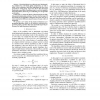Free Online Productivity Tools
i2Speak
i2Symbol
i2OCR
iTex2Img
iWeb2Print
iWeb2Shot
i2Type
iPdf2Split
iPdf2Merge
i2Bopomofo
i2Arabic
i2Style
i2Image
i2PDF
iLatex2Rtf
Sci2ools
87
Voted
CEC
2008
IEEE
2008
IEEE
Direction matters in high-dimensional optimisation
Abstract— Directional biases are evident in many benchmarking problems for real-valued global optimisation, as well as many of the evolutionary and allied algorithms that have been proposed for solving them. It has been shown that directional biases make some kinds of problems easier to solve for similarly biased algorithms, which can give a misleading view of algorithm performance. In this paper we study the effects of directional bias for highdimensional optimisation problems. We show that the impact of directional bias is magnified as dimension increases, and can in some cases lead to differences in performance of many orders of magnitude. We present a new version of the classical evolutionary programming algorithm, which we call unbiased evolutionary programming (UEP), and show that it has markedly improved performance for high-dimensional optimisation.
Artificial Intelligence | CEC 2008 | Directional Biases | Evolutionary Programming | Real-valued Global Optimisation |
Related Content
| Added | 29 May 2010 |
| Updated | 29 May 2010 |
| Type | Conference |
| Year | 2008 |
| Where | CEC |
| Authors | Cara MacNish, Xin Yao |
Comments (0)

